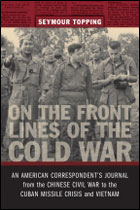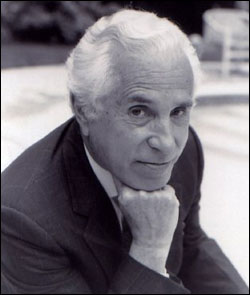New Book by Seymour Topping, BJ ’43, Offers Firsthand Account of the Cold War and Perspectives for Today’s Journalism
By Brian Jarvis
Master’s Student
Columbia, Mo. (July 2, 2010) — “January 1949: I had ventured across the Chinese Nationalist front lines into man’s-land bent on reaching the headquarters of the Communist Party leader Mao Zedong to seek an interview and to cover the advance of his troops on Nanking, Chiang Kai-shek’s capital. Intercepted by Communist guerrillas, I was led to the edge of the Hai-Hai battlefield, where 130,000 Nationalist troops were encircled by 300,000 of Mao’s troops battlefield, and there put under guard in a peasant hut.”

This is an excerpt from the Prologue of Seymour Topping’s new book, “On the Front Lines of the Cold War, An American Correspondent’s Journal from the Chinese Civil War to the Cuban Missile Crisis to Vietnam.” It recalls one of the pivotal moments in the career of Topping, BJ ’43, who covered virtually every major event of the Cold War from 1946 into the 1980s when he worked in turn for the International News Service, the Associated Press and then as correspondent, foreign editor and managing editor of The New York Times.
Published in March of this year by Louisiana State University Press, the book differs from most conventional histories of the period in that Topping was actually on the ground at the events he describes in Asia and Eastern Europe. While a personal memoir, he also documents mishaps in American policy during the Cold War from the administration of Harry Truman to that of George W. Bush, Topping stressing in an Epilogue the importance of journalists monitoring and investigating all that transpires in the formulation of foreign policy so that political leaders can be held fully accountable.
Commenting on the present condition of journalism in an interview, Topping held that journalism, despite present-day economic difficulties, will survive as a viable industry. He regards journalism’s current crisis as one of natural transition into the digital age. He recalls that when radio was developed, many said it would knock out newspapers. Then people were saying radio would disappear because everyone was looking at TV. In the current transition Topping sees journalism maturing into a workable blend of print and the electronic. As a career, he predicts that “it will remain a wonderful profession for those who have the fire in the belly to live through today’s challenges.”
Topping has lived a life in journalism with his photojournalist wife, Audrey Ronning Topping, to which most reporters today can only dream. After covering the Chinese civil war for three years, he opened the Associated Press bureau in Saigon in 1950 and went on to cover the French Indochina and American wars in Vietnam, Cambodia and Laos. Topping met with John F. Kennedy in 1951 when the future president visited Saigon as a young Congressman. Based in London he reported on the Korean War, then Berlin and for The New York Times from Moscow covering the first space shots, de-Stalinization and the Cuban missile crisis.

Asked to what he regards as the most memorable highlights of his career, Topping cites two in particular:
Reporting the Battle of the Huai-Hai, which sealed the victory for Mao Zedong in the Chinese Civil War. The Peoples Liberation Army knocked out more than a half million Nationalist troops in a series of engagements over 65 days. Chinese historians compare Huai-Hai to the decisive battles of Gettysburg and Waterloo. Topping was the only journalist on the Huai-Hai battlefield in its final phase.
“But for sheer drama,” Topping adds, “the single reporting event I recall most vividly, was the night of Nov. 7, 1962, in Moscow. It was the night the Cuban missile crisis ended. At a diplomatic reception in the Kremlin, Soviet Premier Nikita Khrushchev told Topping that Russian rockets were out of Cuba and said: “We were very close – very, very close – to a thermonuclear war. If there had not been reason, we would not be here tonight.” In 1983, Topping got another view of the crisis when he interviewed Cuban leader Fidel Castro in Havana.
On a personal note, Topping speaks with great anguish about the Communist execution of J.C. Jao, BJ ’24, his Chinese assistant in the AP bureau in Nanking. In 1949, soon after Topping left the Communist-occupied city for Hong Kong, Jao disappeared during a countrywide Communist purge. Jao had been resisting Communist demands that he take a job that would have required him to write anti-American propaganda. During the purge many thousands of so-called “counter-revolutionaries” were being executed by Communist firing squads. Jao’s name subsequently appeared in a Communist Party newspaper on a list of executed “counter-revolutionaries.” “Jao should not be forgotten,” Topping said. “He was a fine, courageous journalist and a graduate that the School can justly be proud of,” Topping said.
Topping fondly remembers his undergraduate years at MU. He recalls thriving at the School of Journalism in the early 1940s as a reporter for the Columbia Missourian under the tutelage of Professor Eugene W. Sharp and Dean Frank L. Martin. “It was only my training at the Missourian that enabled me to go straight to work covering the Chinese Civil War when I first landed in China in 1946,” he said. Topping expressed the hope that his book would be read by students who aspire to become foreign correspondents.
At Missouri in 1943, during World War II, several months before commencement, Topping’s ROTC unit was called to active duty. Topping served three years in the army, finally as an infantry officer in the Philippines. It was in 1982, that he at last walked in a commencement parade on campus. Then managing editor of The New York Times, Topping did so in the role of speaker at the Missouri School of Journalism’s commencement. On every return to the campus, first on his agenda is a visit to the plaque in the Memorial Tower to view the names and remember his ROTC classmates who fell in the war.
Topping returned to campus in 2008 for the three-day centennial of the School and the dedication of the Reynolds Journalism Institute celebration. As the former administrator of the Pulitzer Prizes, he served as a moderator of a Futures Forum panel of former University of Missouri winners of the Prize. Topping is a 1968 recipient of the Missouri Honor Medal for Distinguished Service in Journalism. His previous books include “Journey Between Two Chinas”; “Peking Letter: A Novel of China’s Civil War;” and “Fatal Crossroads: A Novel of Vietnam 1945.”
In a comment on Topping’s new book, “On the Front Lines of the Cold War,” Tom Curley, president and CEO of The Associated Press, said: “This book is terrific. Few journalists have ever witnessed as many epic turning points in history from the front line. There’s no substitute for having a first-rate mind on the scene. No one in government or the press over the last half century has confronted the haunting lessons of leaders – success and failure – better.”
Updated: May 13, 2020